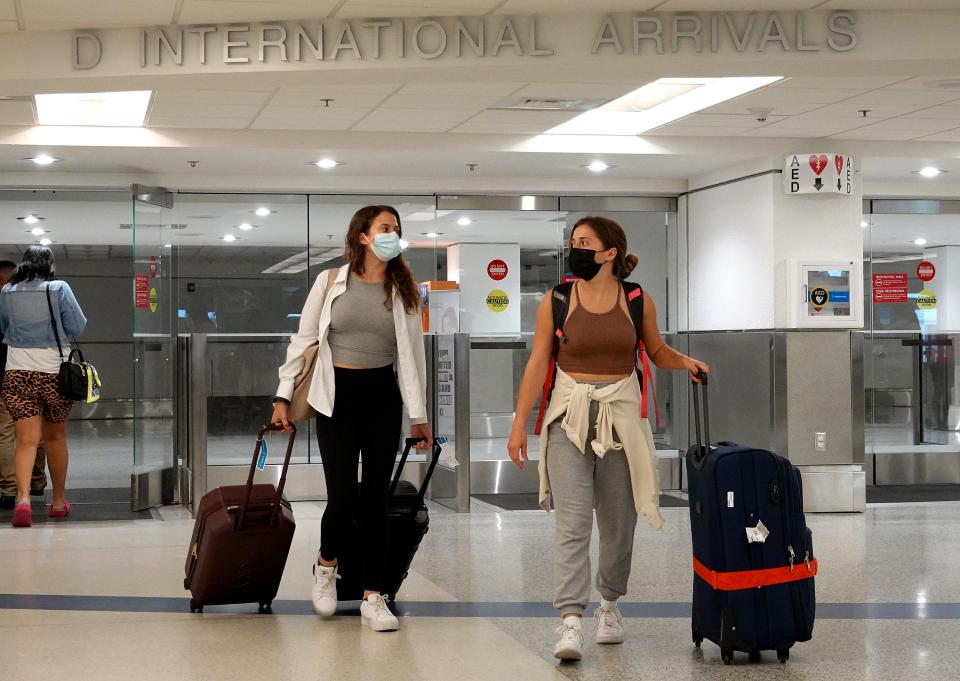New COVID rules for international flights don't just impact foreign tourists: What US travelers need to know
Airlines, tourism officials, European leaders and foreign travelers itching to visit the United States cheered the government's plan, announced Monday, to reopen the country's borders in early November with strict COVID-19 entry requirements.
The White House is billing it as a new "international air travel system" but the changes, which range from vaccination and testing requirements to contact tracing, will effectively put an end to an international travel ban from dozens of countries in place since March 2020.
U.K. Prime Minister Boris Johnson, who among others had urged the U.S. to join it in relaxing entry requirements for vaccinated travelers, tweeted Monday he was "delighted" by the news.
I am delighted that from November, @POTUS is reinstating transatlantic travel so fully vaccinated UK nationals can visit the USA.
It’s a fantastic boost for business and trade, and great that family and friends on both sides of the pond can be reunited once again.
🇬🇧🇺🇸 pic.twitter.com/qbVccvEdrm— Boris Johnson (@BorisJohnson) September 20, 2021
What does it all mean for travelers abroad and American citizens? Several details still need to be worked out before the new rules take effect in early November, according to Jeff Zients, White House COVID-19 response coordinator.
Here's what we know so far about the international travel ban changes:
When is the US lifting the international travel ban?
The new entry rules, which apply to air travelers bound for the United States from any foreign country – not just those covered by the travel ban announced by former President Donald Trump early last year – take effect in early November. The White House did not release a specific date but said the Centers for Disease Control and Prevention, airlines and others need time to iron out the details.
►Which EU countries are open to US tourists? A breakdown of EU travel restrictions by country
What are the new entry requirements for travelers boarding flights to US?
The biggest hurdle for foreign nationals: They must be fully vaccinated to visit. This includes visitors from countries outside the current ban, such as Mexico, who today are allowed to visit the U.S. by showing a negative COVID-19 test.
Airlines will ask to see proof of vaccination before boarding. The U.S. will likely accept vaccines approved for emergency use by the World Health Organization, which include the Pfizer, Moderna, Johnson & Johnson, AstraZeneca, Covishield, CoronaVac and Sinopharm vaccines, according to Sarah Morgenthau, the Department of Commerce's deputy assistant secretary for travel and tourism. She added that there will be "more specifics" announced at a later date.
Foreign nationals must also present a negative COVID-19 test, taken no more than three days before departures, a requirement in place for all U.S.-bound passengers, including vaccinated Americans, since January.
Unvaccinated Americans face more strict testing requirements. (The CDC has recommended for months that unvaccinated Americans avoid international travel.)
►Can I use at home tests? It depends

Will American citizens have to be vaccinated to board international flights to the US?
American citizens won't have to show proof of vaccination to board international flights home to the United States but will still be required to show proof of a negative coronavirus test taken no more than three days before departure.
Unvaccinated Americans will be required to take a COVID-19 test one day before departure – instead of the three-day requirement today – and provide proof they have a second test to take after arrival, Zients said. White House press secretary Jen Psaki did not specify what kind of proof in a briefing Monday.
Are unvaccinated children exempt from US entry rules?
Psaki said unvaccinated children of U.S. citizens and foreign nationals will be subject to the stricter new testing requirements. Today, children ages 2 and older boarding international flights to the United States must show proof of a negative test taken three days before boarding.
White House officials say limited exemptions for children may be added, but no decisions have been made.
What is CDC contact tracing and how will it affect US-bound airline passengers?
The new U.S. entry rules also call for what Zients called a "strong contract tracing system."
Airlines will be required to collect personal information including a phone number and email from U.S.-bound travelers, whether American citizens or foreign nationals. They will be required to keep that information for 30 days in case a passenger is exposed to someone with COVID-19.
"The CDC is going to issue a contract tracing order that will require airlines to request comprehensive information for every passenger coming to the United States and to provide that information promptly to the CDC upon request," Psaki said.
►From Belize to Brazil: Here are the travel restrictions across Central and South America due to COVID-19
Will passengers on international flights to the US have to quarantine when they arrive?
No. The CDC does recommend, however, that unvaccinated Americans who travel internationally self-quarantine for seven days, even if they test negative for the coronavirus when they return home.
Are vaccine mandates ahead for domestic US flights?
Dr. Anthony Fauci, the White House's chief medical adviser and the nation's top infectious disease expert, made headlines this month when he said he supports a vaccine mandate for flights within the U.S. given President Joe Biden's push to increase vaccinations.
Airlines say it would be a logistical nightmare given the volume of flights in the country.
On Monday, Zients reiterated earlier comments that nothing has been ruled out in the fight against COVID-19.
"We clearly have a track record that shows we're pulling available levers to require vaccinations and we're not taking any measures off the table,'' he said.
This article originally appeared on USA TODAY: US to relax international travel restrictions: What you need to know

 Yahoo Movies
Yahoo Movies 
